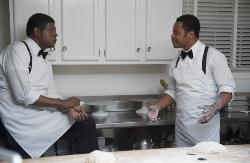Lee
Daniels' The Butler

Inspired
by (but not the
real) true story, Forest Whitaker stars as
Cecil Gaines – a server hired to work at The White House in
1957. He had a long, hard struggle growing up in the South on a cotton
farm and escaping violence to move up North and start a new life, so
he’s very appreciative of this job and the life it affords
him,
his wife (Oprah Winfrey) and his children.
However, as African-Americans struggle with racism and violent
reactions to the Civil Rights movement, a rift has emerged between
Cecil and his oldest son, Louis (David Oyelowo).
Director Lee Daniels and writer Danny Strong (based on the article by
Wil Haygood) present The Butler
(or Lee Daniels’ The
Butler as
they are legally
required to call it) as a complex
journey through the Civil Rights movement, more than having the film as
the stand alone story of one man.
 Because of this, The
Butler (or Lee
Daniels’ The
Butler as the lawyers want to
remind us we have to call it) is
overembellished to make it feel grander and of a greater scope, which
is forced and contrived. It’s like everyone involved is
almost
too scared to let this be a simpler story about a good man facing
adversity, so they have to pump and puff it up with more. Because of this, The
Butler (or Lee
Daniels’ The
Butler as the lawyers want to
remind us we have to call it) is
overembellished to make it feel grander and of a greater scope, which
is forced and contrived. It’s like everyone involved is
almost
too scared to let this be a simpler story about a good man facing
adversity, so they have to pump and puff it up with more.
Earlier in the week, I heard a joke about how this could be an
African-American version of Forrest
Gump, and that joke rings
even more true after I saw Forrest
Gump on TV the other night.
We are left to believe that the Gaines family was at the center of
every major moment in American history from 1957 to 2008, which hurts
the realism of the film.
Cecil is in The Oval Office as President Eisenhower (Robin Williams)
decides whether or not to send troops to force the integration of
schools.
Louis is at the hotel when Martin Luther King, Jr. is assassinated.
Cecil is in the room when President Reagan (Alan Rickman) is discussing
sanctions against South Africa.
Louis is one of those who takes a stool at the counter to protest
segregated seating in restaurants.
Forrest is the one who calls the police when he sees people breaking
into The Watergate (you get the idea).
I was almost ready for Cecil to be bringing Forrest Gump some soda pop
during
one of his many visits to The White House.
However, The Butler
(or Lee Daniels’ The
Butler
as I should call it to avoid a nasty call from the lawyers), contains
some fantastic performances that more than make up for the faults in
storytelling and literary license. Whitaker delivers a great
understated performance full of amazing nuance and overt mastery.
Without a bunch of melodramatic, scene chewing turns, we see Cecil as a
hardworking man who is proud of his accomplishments, full of fear for
his son and troubled about the possible loss of the life he has built.
He also fills Cecil with fierce determination, great dignity and
tangible sorrow.
Meanwhile, Oyelowo is a force for righteousness, and the problems we
see between father and son are heartfelt because he can make the issues
more personal instead of trite and formulaic. I know plenty of people
are buzzing about an Oscar nomination for Oprah, but Oyelowo delivers
more for the Oscar crowd than she does. Oprah is solid and quite good
at the right moments with a character who struggles with alcohol,
temptation and more, but nothing makes you fall out of your seat and
wonder at virtuosity.
Lee
Daniels’ The Butler
(the lawyers
wore me down) is still one of the better movies of the summer, but,
upon seeing it, you realize it was released in the summer as an Oscar
contender, because it won’t be an Oscar contender in
November.
Lee
Daniels’ The Butler is rated PG-13
for some violence and disturbing images, language, sexual material,
thematic elements and smoking.
|